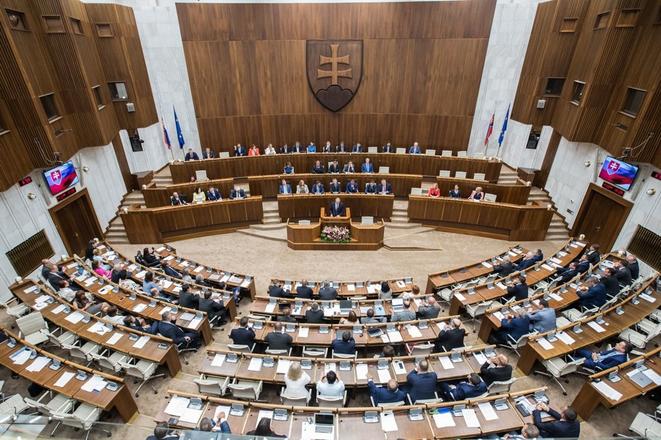The parliament has asked the government to no longer continue in the process of ratifying the Council of Europe Convention on preventing and combating violence against women and domestic violence, known as the Istanbul Convention.
The government should also tell the Council of Europe that Slovakia does not want to become the document’s contractor, the TASR newswire reported.
This stems from a resolution submitted to the parliament by the Slovak National Party (SNS), which was approved by 101 MPs.
The resolution was not supported by Freedom and Solidarity (SaS) MPs, some MPs for the Ordinary People and Independent Personalities (OĽaNO) and Most-Híd, as well as some non-affiliated MPs, TASR wrote.

The adoption of the resolution was a priority for SNS, said the chair of its caucus, Tibor Bernaťák.
“SNS opposes violence against women. We won’t tolerate it, and we’re ready to discuss changes to the laws that would deal with violence against women,” he added, as quoted by TASR.
Ban on adoption by same-sex couples?
SNS had some doubts about certain provisions of the Istanbul Convention, claiming it is at odds with the Slovak Constitution, particularly the definition of marriage as a union between a man and a woman. It also pointed to some ambiguities of removing gender stereotypes.
The senior ruling party Smer also pointed to several problematic parts in the document, such as the definition of gender and the removal of stereotypes.
On the other hand, several opposition MPs stressed the need of the Istanbul Convention and refused a statement that it is at odds with the Slovak Constitution. Ex-justice minister Lucia Žitňanská stressed the need of domestic violence prevention and the necessity of understanding that the relation between a man and a woman should be based on agreement, not permission or a ban on doing something, as reported by TASR.
Smer has stated that it would like to submit a constitutional amendment to the parliament, which should prevent same-sex couples from adopting children. They want to submit the law sometime after the presidential election, said Smer chair Robert Fico, as reported by TASR.
Istanbul Convention is a presidential agreement
Although the parliament asked the government to adopt measures to end the ratification process of the Istanbul Convention, the cabinet cannot actually do so since it is a presidential agreement, Žitňanská explained on Facebook.
“The government negotiated the document based on a commission from the president, and the government member also signed it based on a commission from the president,” Žitňanská wrote.
More specifically, it was Žitňanská who signed the document in 2011 as a member of the second Mikuláš Dzurinda agreement, based on a commission from then-president Ivan Gašparovič, the Denník N daily reported.
This is why the parliament can only recommend the president authorise a cabinet member to stop the ratification process, Žitňanská continued.
“The convention will thus continue living, as well as the issue on the political level,” she added.
Žitňanská and SNS clashed over Istanbul in the past
Slovakia had had its protests against the Istanbul Convention staged by conservatives who see the document as a symbol of “gender ideology” and liberal attitudes regarding women and family. Much like elsewhere in Europe, there has been a lot of distorted information about the document in Slovakia, including the falsehood that it promotes same-sex marriages.



 Slovak parliament, illustrative stock photo (source: Sme)
Slovak parliament, illustrative stock photo (source: Sme)